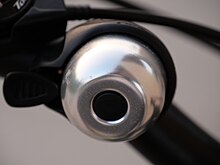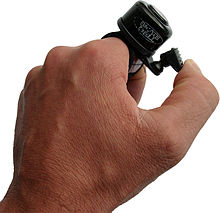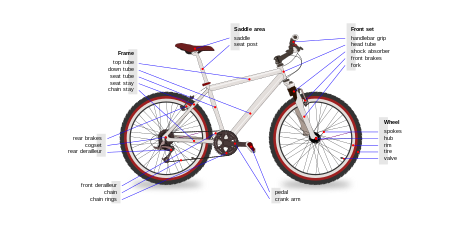Bicycle bell




A bicycle bell is a percussive signaling instrument mounted on a bicycle for warning pedestrians and other cyclists. They are usually mounted on the handlebars and thumb activated.
History
The bicycle bell was invented by John Richard Dedicoat,[1] and patents for bicycle bells appear as early as 1877.[2]
Types
The most common bells are actuated by a thumb-operated lever that is geared to rapidly rotate two loosely slung metal discs inside the bell housing. Said discs repeatedly rattle and strike the bell to produce a sound not unlike that of an electric bell. This type of bell [3] comes in left and right handed versions. Left handed versions are mounted on the left side of the handle bars and are used in countries that drive on the left hand side of the road. The right hand is then free to give traffic signals.
Simpler types also exist, with a spring-mounted external clapper that creates a "ding-ding" sound when the clapper is pulled with a finger and released. Some bells, particularly these "ping" types, work poorly in rainy conditions because water drops clinging to the bell damp the vibrations which produce sound.[citation needed]
Regulations
The bell is a required piece of equipment in some jurisdictions.
In the United Kingdom, bells on new bikes were compulsory until 1983, and again since 1 May 2011.[4]
In New Jersey, a bicycle must be equipped with a bell or other audible device that can be heard at least 100 feet away, but not a siren or whistle.[5]
In Ontario, a bike must have a bell or horn in good working order.[6]
In Western Australia, a person riding a bicycle must have a bell or similar warning device.[7]
In the Czech Republic, bells or other signalling device were required until 1 August 2002.
- From the turn of the 19th and 20th centuries, local police regulations for cyclists for individual cities are known (Prague 1893 and 1896,[8] České Budějovice 1905[9]). Both these documents required velocipedes to be equipped with a warning bell. However, the rules from České Budějovice allowed to give sound signals also with a whistle.
- Czechoslovak ordinance 145/1958 Ú. l. (§ 49/2) stipulated that bicycles must be equipped by a clear-sounding bell audible at a sufficient distance; other audible warning devices were prohibited for bicycles.
- Czechoslovak federal ordinance 32/1972 Sb. (§ 76/2/h) stipulated that bicycles must be equipped by a clear-sounding bell audible at a sufficient distance. Bells were allowed as the signallling device also for single-track motor vehicles with a cylinder capacity of up to 50 cm3 and with a maximum design speed of up to 40 km/h (§ 55/1).
- Czechoslovak federal ordinance 90/1975 Sb. (§ 76/2/h) stipulated that bicycles must be equipped by a clear-sounding bell audible at a sufficient distance. Bells were allowed as the signallling device also for single-track motor vehicles with a cylinder capacity of up to 50 cm3 and with a maximum design speed of up to 40 km/h (§ 55/1).
- Czechoslovak federal ordinance 41/1984 Sb. (§ 73/1/h) stipulated that bicycles must be equipped by a clear-sounding bell audible at a sufficient distance; bicycles for preschool children may be equipped with a sound signaling device other than a bell. Bells were allowed also for mopeds (§ 54/1).
- Czech ordinance 102/1995 Sb. (§ 99/1/h) stipulated that bicycles must be equipped by a clear-sounding bell audible at a sufficient distance; bicycles for preschool children may be equipped with a sound signaling device other than a bell. Bells were allowed also for small motocycles of L1 category (§ 67/1).
- Ordinance 301/2001 Sb. (§ 16/1/b) stated as a condition for the operation of a bicycle on roads (of all categories) to be equipped with a clear-sounding bell or similar device ("jasně znějícím zvonkem nebo obdobným zařízením").
- Later ordinances ordinances of the Ministry of Transport 341/2002 Sb. since 1 August 2002 (appendix 13), 341/2014 Sb. (appendix 12 chapter C), 153/2023 Sb. (appendix 8) don't require acoustic signalling device for bicycles and similar vehicles.
As musical instruments
Bicycle bells have also been used as musical instruments in such notable recordings as "You Still Believe in Me" on Pet Sounds by The Beach Boys[10] and "Bicycle Race" by Queen and more.
See also
References
- ^ "Bicycle Bell - Types, Facts and History of Bike Bells".
- ^ The Federal Reporter (PDF). Vol. 73. West Publishing Co. 1896. p. 470. Archived from the original (PDF) on May 13, 2010. Retrieved 2013-04-21.
The Rockwell patent, No. 471,982, for a bicycle bell, consisting of a combination of a base plate, with a revoluble striker bar, spring-actuated in one direction, a lever operatively connected therewith, and adapted to rotate the striker bar in opposition to the force of the spring, and a gong, held invalid because of anticipation by the English patent, No. 2,425, of June 22, 1877, to Alfred Bennett, for improvements in call bells, door bells, etc. 64 Fed. 859. reversed.
See also US 471982, E.D. Rockwell, "Bell", published March 29, 1892 - ^ 7 Types of Bike Bells & 5 Tips for Choosing the Right One
- ^ "Welcome back, bicycle bell". BBC News. 29 April 2004. Retrieved 2011-07-03.
If you get a brand new bicycle from 1 May, make sure its got a brand new bell. Bells on new bikes were compulsory until 1983, but from this weekend they will once again be mandatory.
- ^ "Bicycling in New Jersey Regulations". State of New Jersey Department of Transportation. November 8, 2010. Retrieved 2011-07-03.
39:4-11 Audible Signal. A bicycle must be equipped with a bell or other audible device that can be heard at least 100 feet away, but not a siren or whistle.
- ^ "Ontario's Guide to Safe Cycling". Ontario Ministry of Transportation. June 20, 2010. Archived from the original on 2011-07-06. Retrieved 2011-07-03.
HTA 75 (5) - Bell: a bike must have a bell or horn in good working order. Set fine: $85.00
- ^ "Cycling Fact Sheet No. 46: Ring your bell to make others aware" (PDF). Government of Western Australia Department of Transportation. Archived from the original (PDF) on 2011-04-08. Retrieved 2011-07-03.
Pedestrians have right-of-way on the State's shared path system and the onus is on cyclists to provide a clear warning of their presence, particularly when approaching another path user from behind. For that reason, a person riding a bicycle in WA must have a bell or similar warning device that is in good working order.
- ^ Jízdní řád pro velocipedisty v pražském policejním obvodu, Ordinance No. 35.294, Prague Police Directory, In: Dan Hrubý: „Pozóóór! Jedu!“ zakřičel cyklista a srazil zedníka Hroudu ze žebříku. In: Jedna, Magazín Městské části Praha 1, June 2022, page 28
- ^ Jízdní řád pro bicykle a tricykle platný pro obvod města Budějovice, listed on the cyclist license from 21 April 1905, In: Martin Maršík: České Budějovice objektivem Milana Bindera a perem Martina Maršíka: květnatá mluva cyklistická, Budějcká drbna, 31 March 2020
- ^ Adam Webb (2003-11-07). "Brian Wilson Presents Pet Sounds Live In London (DVD) Review". BBC. Retrieved 2011-07-03.

